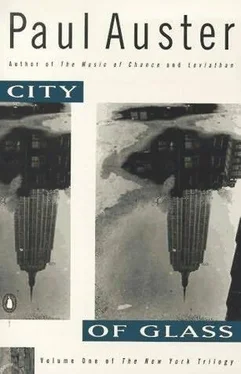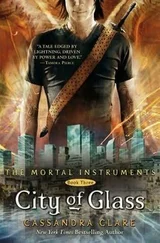Paul Auster - City of Glass
Здесь есть возможность читать онлайн «Paul Auster - City of Glass» весь текст электронной книги совершенно бесплатно (целиком полную версию без сокращений). В некоторых случаях можно слушать аудио, скачать через торрент в формате fb2 и присутствует краткое содержание. Жанр: Современная проза, на английском языке. Описание произведения, (предисловие) а так же отзывы посетителей доступны на портале библиотеки ЛибКат.
- Название:City of Glass
- Автор:
- Жанр:
- Год:неизвестен
- ISBN:нет данных
- Рейтинг книги:5 / 5. Голосов: 1
-
Избранное:Добавить в избранное
- Отзывы:
-
Ваша оценка:
- 100
- 1
- 2
- 3
- 4
- 5
City of Glass: краткое содержание, описание и аннотация
Предлагаем к чтению аннотацию, описание, краткое содержание или предисловие (зависит от того, что написал сам автор книги «City of Glass»). Если вы не нашли необходимую информацию о книге — напишите в комментариях, мы постараемся отыскать её.
City of Glass — читать онлайн бесплатно полную книгу (весь текст) целиком
Ниже представлен текст книги, разбитый по страницам. Система сохранения места последней прочитанной страницы, позволяет с удобством читать онлайн бесплатно книгу «City of Glass», без необходимости каждый раз заново искать на чём Вы остановились. Поставьте закладку, и сможете в любой момент перейти на страницу, на которой закончили чтение.
Интервал:
Закладка:
"Yes?"
There was a long pause on the other end, and for a moment Quinn thought the caller had hung up. Then, as if from a great distance, there came the sound of a voice unlike any he had ever heard. It was at once mechanical and filled with feeling, hardly more than a whisper and yet perfectly audible, and so even in tone that he was unable to tell if it belonged to a man or a woman.
"Hello?" said the voice.
"Who is this?" asked Quinn.
"Hello?" said the voice again.
"I'm listening," said Quinn. "Who is this?"
"Is this Paul Auster?" asked the voice. "I would like to speak to Mr. Paul Auster."
"There's no one here by that name."
"Paul Auster. Of the Auster Detective Agency."
"I'm sorry," said Quinn.
"You must have the wrong number."
"This is a matter of utmost urgency," said the voice.
"There's nothing I can do for you," said Quinn. "There is no Paul Auster here."
"You don't understand," said the voice. "Time is running out."
"Then I suggest you dial again. This is not a detective agency.
Quinn hung up the phone. He stood there on the cold floor, looking down at his feet, his knees, his limp penis. For a brief moment he regretted having been so abrupt with the caller. It might have been interesting, he thought, to have played along with him a little. Perhaps he could have found out something about the case-perhaps even have helped in some way. "I must learn to think more quickly on my feet," he said to himself.
Like most people, Quinn knew almost nothing about crime. He had never murdered anyone, had never stolen anything, and he did not know anyone who had. He had never been inside a police station, had never met a private detective, had never spoken to a criminal. Whatever he knew about these things, he had learned from books, films, and newspapers. He did not, however, consider this to be a handicap. What interested him about the stories he wrote was not their relation to the world but their relation to other stories. Even before he became William Wilson, Quinn had been a devoted reader of mystery novels. He knew that most of them were poorly written, that most could not stand up to even the vaguest sort of examination, but still, it was the form that appealed to him, and it was the rare, unspeakably bad mystery that he would refuse to read. Whereas his taste in other books was rigorous, demanding to the point of narrow-mindedness, with these works he showed almost no discrimination whatsoever. When he was in the right mood, he had little trouble reading ten or twelve of them in a row. It was a kind of hunger that took hold of him, a craving for a special food, and he would not stop until he had eaten his fill.
What he liked about these books was their sense of plenitude and economy. In the good mystery there is nothing wasted, no sentence, no word that is not significant. And even if it is not significant, it has the potential to be so-which amounts to the same thing. The world of the book comes to life, seething with possibilities, with secrets and contradictions. Since everything seen or said, even the slightest, most trivial thing, can bear a connection to the outcome of the story, nothing must be overlooked. Everything becomes essence; the center of the book shifts with each event that propels it forward. The center, then, is everywhere, and no circumference can be drawn until the book has come to its end.
The detective is one who looks, who listens, who moves through this morass of objects and events in search of the thought, the idea that will pull all these things together and make sense of them. In effect, the writer, and the detective are interchangeable. The reader sees the world through the detective's eyes, experiencing the proliferation of its details as if for the first time. He has become awake to the things around him, as if they might speak to him, as if, because of the attentiveness he now brings to them, they might begin to carry a meaning other than the simple fact of their existence. Private eye. The term held a triple meaning for Quinn. Not only was it the letter "i," standing for "investigator, it was "I" in the upper case, the tiny life-bud buried in the body of the breathing self. At the same time, it was also the physical eye of the writer, the eye of the man who looks out from himself into the world and demands that the world reveal itself to him. For five years now, Quinn had been living in the grip of this pun.
He had, of course, long ago stopped thinking of himself as real. If he lived now in the world at all, it was only at one remove, through the imaginary person of Max Work. His detective necessarily had to be real. The nature of the books demanded it. If Quinn had allowed himself to vanish, to withdraw into the confines of a strange and hermetic life, Work continued to live in.the world of others, and the more Quinn seemed to vanish, the more persistent Work's presence in that world became. Whereas Quinn tended to feel out of place in his own skin, Work was aggressive, quick-tongued, at home in whatever spot he happened to find himself. The very things that caused problems for Quinn, Work took for granted, and he walked through the mayhem of his adventures with an ease and indifference that never failed to impress his creator. It was not precisely that Quinn wanted to be Work, or even to be like him, but it reassured him to pretend to be Work as he was writing his books, to know that he had it in him to be Work if he ever chose to be, even if only in his mind.
That night, as he at last drifted off to sleep, Quinn tried to imagine what Work would have said to the stranger on the phone. In his dream, which he later forgot, he found himself alone in a room, firing a pistol into a bare white wall.
The following night, Quinn was caught off guard. He had thought the incident, was over and was not expecting the stranger to call again. As it happened, he was sitting on the toilet, in the act of expelling a turd, when the telephone rang. It was somewhat later than the previous night, perhaps ten or twelve minutes before one. Quinn had just reached the chapter that tells of Marco Polo's journey from Peking to Amoy, and the book was open on his lap as he went about his business in the tiny bathroom. The ringing of the telephone came as a distinct irritation. To answer it promptly would mean getting up without wiping himself, and he was loath to walk across the apartment in that state. On the other hand, if he finished what he was doing at his normal speed, he would not make it to the phone in time. In spite of this, Quinn found himself reluctant to move. The telephone was not his favorite object, and more than once he had considered getting rid of his. What he disliked most of all was its tyranny. Not only did it have the power to interrupt him against his will, but inevitably he would give in to its command. This time, he decided to resist. By the third ring, his bowels were empty. By the fourth ring, he had succeeded in wiping himself By the fifth ring, he had pulled up his pants, left the bathroom, and was walking calmly across the apartment. He answered the phone on the sixth ring, but there was no one at the other end. The caller had hung up.
The next night, he was ready. Sprawled out on his bed, perusing the pages of The Sporting News, he waited for the stranger to call a third time. Every now and then, when his nerves got the better of him, he would stand up and pace about the apartment. He put on a record-Haydn's opera Il Mondo della Luna- and listened to it from start to finish. He waited and waited. At two-thirty, he finally gave up and went to sleep.
He waited the next night, and the night after that as well. Just as he was about to abandon his scheme, realizing that he had been wrong in all his assumptions, the telephone rang again. It was May nineteenth. He would remember the date because it was his parents' anniversary-or would have been, had his parents been alive-and his mother had once told him that he had been conceived on her wedding night. This fact had always appealed to him-being able to pinpoint the first moment of his existence and over the years he had privately celebrated his birthday on that day. This time it was somewhat earlier than on the other two nights-not yet eleven o'clock-and as he reached for the phone he assumed it was someone else.
Читать дальшеИнтервал:
Закладка:
Похожие книги на «City of Glass»
Представляем Вашему вниманию похожие книги на «City of Glass» списком для выбора. Мы отобрали схожую по названию и смыслу литературу в надежде предоставить читателям больше вариантов отыскать новые, интересные, ещё непрочитанные произведения.
Обсуждение, отзывы о книге «City of Glass» и просто собственные мнения читателей. Оставьте ваши комментарии, напишите, что Вы думаете о произведении, его смысле или главных героях. Укажите что конкретно понравилось, а что нет, и почему Вы так считаете.












